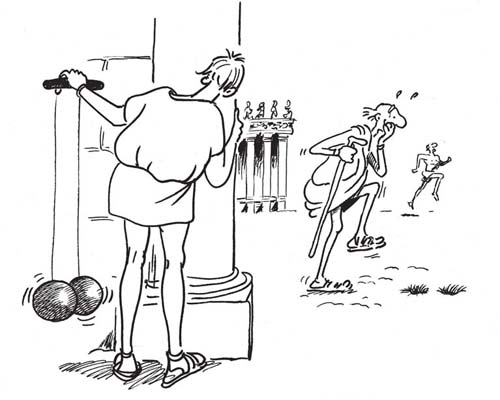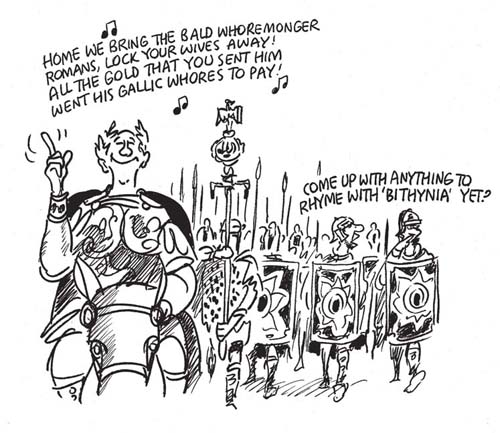
Among the Ancient Greeks, as depicted on vases, male homosexuals did indulge in anal intercourse, but they also often rubbed the penis back and forth between the young man’s thighs — this is known as intercrural intercourse.
Straton, a Greek physicist of the 3rd century BC, compared girls unfavourably with boys: ‘They’re all so dull from behind, and the main thing is, you’ve nowhere to put a roaming hand’.
Dioskorides, a Greek doctor of the first century AD, recommends a friend to ‘delight in the rosy bum’ of his wife when she is pregnant, treating her as a ‘male Aphrodite’, and Rhianos rapturously talks of the ‘glorious bum’ of a boy, so beautiful that even old men itch for it.
The fifth/fourth century BC Greek playwright Aristophanes, in Birds, has a character say ‘Where the father of a good-looking boy will meet me and go on at me as if I’d done him a wrong:
That was a nice way to treat my son, Stilbonides! You met him when he’d had a bath, leaving the gymnasium, and you didn’t kiss him… you didn’t say a word to him, you didn’t pull him close to you, you didn’t tickle his balls — and you an old friend of the family!
And in Knights, the Sausage-Seller says ‘..here’s a folding stool for you, and a boy (he’s no eunuch) who’ll carry it for you. And if you feel like it sometimes, make a folding-stool of him!’.
Greek vases often show old men fingering the genitals of young men. In the play Clouds by Aristophanes, it is recalled that when boys ‘were sitting in the trainer’s, they had to put one thigh forward in order not to show anything cruel to those outside. Then, when a boy got up again, he had to brush the sand together and take care not to leave an imprint of his youth’ for the old men to look at. This means that the sight of the boys’ genitals would torment the spectators, while the old men might brood longingly over the mark in the sand where the genitals had rested (10).

10
It was said that Julius Caesar had been King Nicomedes’s catamite — and this was frequently quoted by his enemies. For example, Licinius Calvus wrote ‘The riches of Bithynia’s King Who Caesar on his couch abused’, while Dolabella called him ‘the Queen’s rival and inner partner of the royal bed’, and Curio the Elder ‘Nicomedes’s Bithynian brothel’. Bibulus, Caesar’s colleague in the consulship, called him ‘the Queen of Bithynia’. When his own soldiers followed his decorated chariot in the Gallic triumph, they chanted ribald songs, as they were privileged to do (11):

11
Home we bring our bald whoremonger
Romans, lock your wives away!
All the bags of gold you lent him
Went his Gallic whores to pay.’
Caesar also had numerous and extravagant affairs with women, including several queens, and was called ‘every woman’s husband and every man’s wife’.
Mark Antony alleged that Julius Caesar made Octavian (Augustus) submit to unnatural relations as the price of adoption; Octavian was also said to have sold his favours to the Governor-General of Spain for 3000 gold pieces, and it was claimed that he used to soften the hair on his legs by singeing them with red-hot walnut shells.
Once, while sacrificing, the emperor Tiberius (42 BC–AD 37) took an erotic fancy to the acolyte who carried the incense casket, and could hardly wait for the ceremony to end before hurrying him and his brother, the sacred trumpeter, out of the temple and indecently assaulting them both. When they protested at this, he had their legs broken.
The emperor Caligula persistently teased Cassius Charea, who was no longer young, for his supposed effeminacy. Whenever he demanded the watchword, Caligula used to give him ‘Priapus’ or ‘Venus’; and if he came to acknowledge a favour, always stuck out his middle finger for him to kiss, and waggled it obscenely.
Aristophanes’ comedy is rich in obscene and scatological invective, and abounds in abusive terms alluding to anal sex — ‘Wide-assed’ (euryproktos) was a common insult that he expanded into’with gaping ass hole’ (chaunoproktos). The politician Cleisthenes was evidently known as a passive homosexual, and Aristophanes never tired of making fun of his effeminate ways and his hospitable rear end.
The concept of anal penetration as demeaning and humiliating is perhaps best seen in what may be termed the ‘radish treatment’ (see below, p.88).
One Greek vase shows a Persian captive about to submit to anal penetration by a Greek.
Eubolos, a comic poet of the fourth century, said of the Greeks who spent ten long years in capturing Troy: ‘No one ever set eyes on a single hetaira (harlot); they wanked themselves for ten years. It was a poor sort of campaign for the capture of one city, they went home with arses much wider than the gates of the city that they took.’ (12)
12